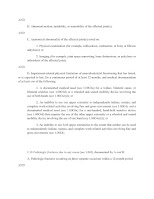Social Security has released FAQs on the new musculoskeletal Listings due to go into effect on Good Friday. Here is an excerpt:
Q4: What percent of decisions do adjudicators make using these revised rules?
A4: We decide claims involving musculoskeletal impairments primarily at step 5 of the sequential evaluation process where we consider a claimant’s residual functional capacity (RFC), age, education, and work experience. Specifically, we make 90 percent of allowances due to a musculoskeletal impairment using the medical-vocational rules at step 5 of the sequential evaluation process, which have not changed. The remaining 10 percent of the people who apply for disability benefits and are found disabled after an initial review due to a musculoskeletal impairment meet (or medically equal) a musculoskeletal disorders listing. We do not expect this to change because of these final rules.
Q5: How do these changes affect vulnerable populations?
A5: Our Office of the Chief Actuary’s (OCACT) primary conclusion for these rules are that the net effect of the new listings will be very small for both Social Security Disability Insurance (SSDI) and SSI. OCACT estimated that for SSI, there would be a very small net increase in SSI awards of roughly 180 annually. For SSDI, there would be a very small net reduction in disability awards of roughly 260 annually due to these listings.
OCACT estimated that implementation of these final rules will result in a net increase in SSI payments of $67 million over fiscal years 2021-2030, and a net reduction in scheduled Old-Age, Survivors, and Disability Insurance (OASDI) benefits of $263 million over the same period, assuming implementation in January 2021. Our Office of Budget, Finance, and Management estimates administrative savings of less than 15 work years and $2 million annually.
It is important to note that while the estimated effects of changes from allowance to denial and from denial to allowance are largely offsetting, the actual net effect for either program, SSDI or SSI, could potentially be either a small cost or a small saving.
Seriously, you're telling us these new Listings will make almost no difference in the number of claims approved? What was the point of the new Listings then? Social Security isn't claiming that these have anything to do with advances in medicine.
Why is the Chief Actuary's office trying to evaluate whether a change in the Listings will result in more or fewer claims being approved? It's outside their field of expertise. How is it even conceivable that these new Listings would increase the number of SSI claims approved, even in a small way? There's nothing to these new Listings other than a tightening of criteria across the board.
Why hasn't the Chief Actuary released their study? There were repeated questions about this on a conference call I listened to yesterday and Social Security refused to answer the question, even though the Chief Actuary, Steve Goss, was on the call. Their partial answer to another question suggested that the Chief Actuary's office may have only looked at claimants age 50 and older. The largest effect of these new Listings, however, will be on claimants under the age of 50. I guess the Actuary's projection is how they sold this to OMB and the Biden Administration, making it an important document. I think we ought to be able to see it.
I will say this. If they start being more reasonable in determining Residual Function Capacity (RFC) at the Initial and Reconsideration levels it would be possible to offset the negative effects of these new Listings. However, prior experience tells me to expect the exact opposite. Again, there was never any point to the Listings changes other than to deny more claimants. Any other reasons Social Security has given for these changes have been nothing more than window dressing.











